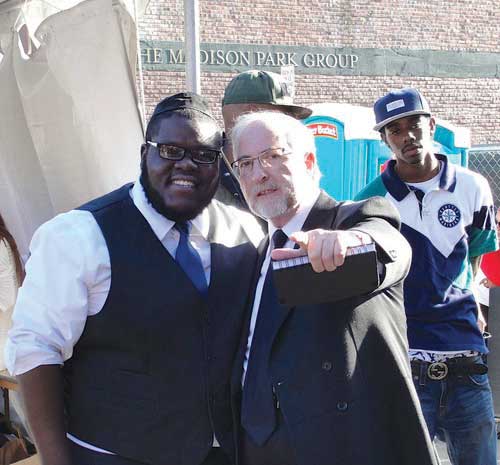.jpg)
SEATTLE—Most Orthodox rabbis who earn the title “emeritus” retire to a quiet life of teaching and learning and visiting the sick. Emeritus Rabbi Simon Benzaquen, who recently retired after decades of service to Seattle’s Sephardic Bikur Cholim congregation, does all of those activities, but now has a new and distinctly unorthodox career—as vocal accompanist to popular rapper Nissim.
Nissim, formerly known in Seattle rap circles as D. Black, was getting serious about converting to Judaism when he first heard Rabbi Benzaquen chanting Kiddush after Shabbat services several years ago. “I was blown away by his powerful voice,” says Nissim, who converted last year with his family under the Orthodox tutelage of Rabbi Benzaquen.
Fast forward to Memorial Day 2013, and the newly retired rabbi and newly observant 26-year-old rapper were appearing together on stage at the popular Sasquatch Music Festival at the Gorge Amphitheatre in eastern Washington, alongside stars like Elvis Costello and Mumford and Sons.
Spanish-born Rabbi Benzaquen, decked out in his usual rabbinic uniform of smart white shirt, black tie and suit and black hat, intersperses Hebrew verses over several of Nissim’s numbers. The young crowd of rap fans shows their approval by dancing and waving in rhythm.
Since then, Rabbi Benzaquen, who studied at prestigious yeshivot in the UK and has smicha from The Rabbinical Academy of Marseille, France, has joined Nissim on stage at gigs that include a Seattle live music club and the Capitol Hill Block Party, an annual showcase of the Pacific Northwest’s best bands and DJs.
All through his career as a congregational rabbi in Westcliff, England, Maracaibo, Venezuela, and Seattle, Rabbi Benzaquen put his training in chazzanut from London’s Jews College to good use, but he never expected his recording debut to be on a rap album.
“I used to dismiss rap completely,” says Rabbi Benzaquen in his Spanish-accented English. “I thought it was inflammatory, full of four-letter words and derogatory towards women. But now I feel that rap has got a bad rap! It’s the African American expression of everyday life.”
“Think about the Torah when it wants to teach us something,” he explains, “it’s often through shira: song or poetry. That’s what stays with you. That’s why rap can be powerful today and convey a positive message.”
In a cut called “Sores” on the forthcoming album due for release mid-September, Rabbi Benzaquen does a moving voice-over of Hebrew verses from Psalms, set to his own haunting melody, as Nissim raps two stories, one about African American oppression and another about a Jew suffering during the Holocaust.
“Nobody captures emotion like Rabbi Benzaquen,” Nissim says of his mentor’s vocal talent.
For his part, Rabbi Benzaquen exclaims passionately in response, “There are no two peoples who should be more connected than African Americans and Jews. We could learn a lot from each other.”
Both Nissim and the rabbi see their music as an opportunity to positively impact the world. “I feel a mission to help bring back unity between the African American and Jewish communities who were so close during the civil rights movement,” says Rabbi Benzaquen.
“My main point is to elevate the world,” Nissim tells JNS.org. “I have 3-4 minutes of someone’s time, and I don’t want to waste it. I want to say something to help them; to help them think about their lives and get past the struggles,” he says.
But for some in the modern Orthodox community of South Seattle, Nissim’s presence in the community has proven to be a way to re-inspire their own members.
“When I first met him, I saw that Nissim had the potential to outreach to members of our community who normally wouldn’t take Judaism seriously, such as the teens and young adults who have stopped coming to synagogue. There’s nothing more inspiring to born Jews than converts who take Judaism seriously. As a hip hop rapper, and someone who’s worked with disadvantaged teens, Nissim was a natural, and the youth and young adults were immediately drawn to him, his knowledge of Judaism, and his natural emunah,” explains community activist Rick Eskenazi, a veteran member of Rabbi Benzaquen’s congregation.
Rick and a number of Seattle youth from the congregation and the local day school and yeshiva high school have accompanied Nissim and the rabbi to their shows and feature in several of Nissim’s new videos.
Along with the forthcoming album, Nissim’s future plans include a November visit to Israel for some intense Jewish learning and a possible benefit appearance for the Beit Shemesh Educational Center for disadvantaged boys.
It’s probably safe to say that Rabbi Benzaquen, a long-time member of the Va’ad HaRabanim of Greater Seattle, who is also a certified mohel, sofer, shochet, chazan and accomplished ketubah artist, is the only retired Orthodox rabbi who can add “rapper” to his resume.
By Judy Lash Balint/JNS.org









